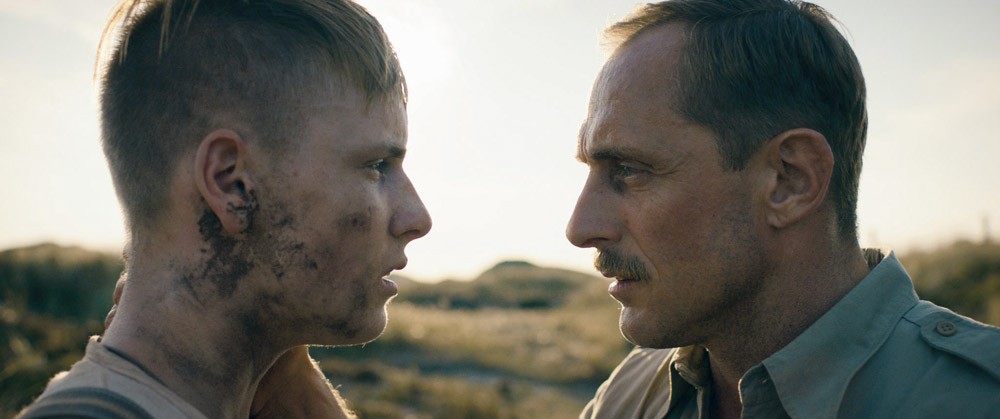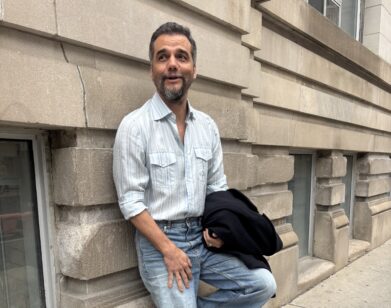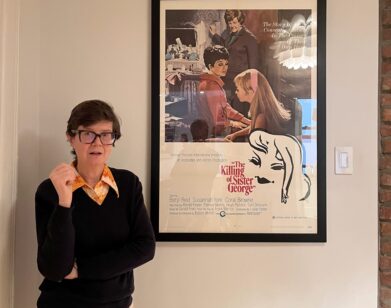Know Thine Enemy

PHOTO COURTESY OF SONY PICTURES CLASSICS.
“I was looking for the dark chapters of Denmark,” says writer-director Martin Zandvliet of his film Land of Mine, which debuted at the Toronto International Film Festival in 2015 and is now out in New York and L.A. via Sony Pictures Classics. Set directly after World War II, the film follows a group of German POWs tasked with diffusing 45,000 Nazi mines hidden along a Danish beach. Far from being battle-hardened, the soldiers are a ragtag group of hungry, homesick teenagers—the dregs of a decimated German army. Though Carl Rasmussen, the Danish sergeant overseeing the cleanup, begins the film filled with bitterness, he finds himself increasingly conflicted regarding his young charges. “It took me four years or more to write,” says Zandvliet of the film. “You often lose interest in your projects, but the reason I kept writing was that I wanted to show that we, as humans, should think twice about becoming the monster that we’re fighting. It’s not about pointing fingers; it’s about the dilemma Carl is facing. I totally understand his hatred, and the lust for revenge after a war, and I tried to draw a parallel with the society that we live in now.”
After the success of Land of Mine on the festival circuit, Zandvliet began filming his English language debut, The Outsider. Starring Jared Leto, the film is set in the Japanese underworld. “After Land of Mine, I got a lot of offers, and there was something about this script I thought was interesting,” Zandvliet explains. “It’s about a lost soul, a man with post-traumatic stress in a world that isn’t his,” he continues. “I wanted to see if I could do an international film, and you always hear about directors being caught up in American films and then they lose control. Then I just liked the Japanese culture.”
EMMA BROWN: Did you grow up in a particularly creative family?
MARTIN ZANDVLIET: No, actually I didn’t. My mother was a cashier in the supermarket and grew up in a home with no books at all. My father left me when I was very little. I remember going to the library and starting to read on my own. I think we had the Guinness World Records, that was the only book in our house. I started on my own when I was 15 with Franz Kafka’s Letter to His Father, and then Camus, Sartre, Dostoyevsky. It was not that I come from a very creative home; it was more of a struggle out of the ghetto, so to speak.
BROWN: Did you watch a lot of movies when you were growing up?
ZANDVLIET: Yes, all the time. [laughs] I was always placed in front of the TV. Everything that was there, I saw. I was one of the kids who watched everything in the video store twice.
BROWN: I know your first went to TIFF with a documentary in 2002, Angels of Brooklyn. Did you start your film career thinking you would stick to nonfiction?
ZANDVLIET: Maybe. I wanted to be a surfer and I started filming the surf competitions because I quickly found out that I wasn’t going to be as good as I hoped; I was never going to live off it. [But] I think you are where you are and you have eyes on the ball. When we did Angels of Brooklyn, that was our world. We hadn’t even done short films before that—Angels of Brooklyn was our first big thing. We spent two years on that and that’s all you focus on. The next step is always the next step; at least that’s how I do it—that’s how me and my wife do it. We did the documentary together, we did Land of Mine together, and we just finished another one film in Japan together as well. I just focus on where I am right now.
BROWN: It’s pretty impressive that your first film got into Toronto.
ZANDVLIET: Yeah, it was pretty good. It was funny because in Denmark, you have a government fund supporting people, and they kept on saying to us, “You can’t just do a feature length documentary—you need to do 10 minutes [first].” We said, “We saved up a lot of money, so we’re going to go over there and we’re going to shoot the movie anyway. You can be in on it if you want to or not.” This was on a Thursday, and we were leaving Monday, and by Monday noon we had the money from the government to shoot the movie. Denmark is sometimes a very helpful country in that manner.
BROWN: Do you feel like Land of Mine has really changed things for you in terms of your career?
ZANDVLIET: It definitely has. It surprised me how much it touches people, because in a way it’s a very local story. It surprised me, when I showed it in Asia, how much it had an impact on people there. It’s about Germany, it’s not just about the boys. It’s also about the relationships between people. It’s about hate. It’s about what happens after a war. It almost feels like the more local, the more global.
BROWN: The young actors that played the German soldiers in Land of Mine, had most of them acted before?
ZANDVLIET: A few of them had. Louis Hofmann, who played Sebastian, had and Joel Basman, Helmut, had acted before. The other ones hadn’t. The twins had never acted before. Roland [Møller], who plays the sergeant, it’s his first leading role. I cast the boys through Simone Bär, who is normally Michael Haneke’s casting director, and we had a long talk about what kind of boys I wanted and where they should be from—the different social layers of Germany and stuff like that. It was important to me that it wasn’t the normal boys that you’d seen in Christmas movies, that you believed in the boys that were there. So they’re all pretty new in their careers.
BROWN: How much did you discuss each character’s backstory with the actors? Did you go beyond what’s revealed in the film?
ZANDVLIET: They all had backstories. Sebastian, the lead of the boys, he was one of the evil ones [during the war] and Helmut, who seems like the evil one, he was actually never in the war. He stole his uniform from his brother. They all had different stories; it gave them a lot to play their roles. Plus, it was shot in the exact place where the story actually happened—where they cleared the mines. That also had a great impact on the boys—they felt like they were stepping back in history.
BROWN: Did it feel haunted?
ZANDVLIET: In a way for them, I think it did. We used real explosions—not real explosions, but it’s all done analog, so there’s no CGI in the movie. And four days before we started shooting we found a real mine, so I think the boys were a bit nervous.
BROWN: What was the mood like on set? Was it a particularly emotional movie to film?
ZANDVLIET: I wouldn’t say so. The boys are teenagers, and teenagers are what teenagers. It’s a very small, small city where we shot it and all the fathers of daughters in that city were screaming at the boys because they were out having fun at night. They’re difficult to handle. But it was fun. We played football. I think it’s important that you have fun.
LAND OF MINE IS OUT NOW IN SELECT THEATER IN L.A. AND NEW YORK.






